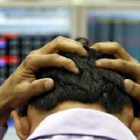Fear of an imminent market crash can cause chaos in the minds of investors. Faced with the prospect of seeing hard-earned gains wiped out, it’s understandable why some reach for the sell button and seek safety in cash. Yet the temptation to trade out of shares can be costly. Unwinding positions means taking a hit on the costs of dealing spreads, crystallising capital gains liabilities and even missing out on dividend income. One way of tackling this problem is to resist the urge to sell-up and hedge the portfolio instead. Among the most common ways of doing that is to use a Put Option.
Back in 2008, fund manager Gervais Williams, then at Gartmore (now at Miton), managed to protect his small-cap growth fund from the worst effects of the market crash. As market valuations fell, Williams managed to offset most of the losses that were racking up in his fund. To boot, he ended up with a considerable cash war chest to buy up what had become cheaply-priced assets. All this was done with the help of a Put Option that he’d been holding for a few years (and something that he has held in his funds at Miton over the past year).
What is a Put Option?
In the vocabulary of options trading, a ‘Put’ is a bet on an asset falling in price. Puts can be used as an outright bet on falling asset prices, or more commonly to “hedge” the downside risk of a share portfolio without having to sell any of the underlying assets.
In the case of portfolio hedging, an index Put Option acts much like an insurance policy. It can be bought through a trading platform or as a spread bet or contract for difference - with the potential to add leverage to the trade. It’s a contract that gives the buyer the option - but not the obligation - to sell an asset at a pre-defined ‘strike’ price. It could be an individual stock, a sector or an index. In the case of Gervais Williams it was the FTSE 100.
As Stockopedia’s Paul Scott has noted, Put Option contracts can be expensive to buy and often end up worthless. Yet they do offer comfort in the face of a possible market meltdown.
Dynamics of a Put Option
Buying a Put Option involves paying a premium to the Put seller - who is…










